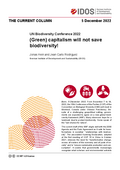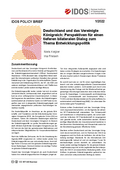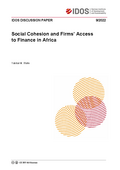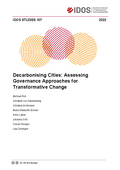-

Publications
Photo: www.shutterstock.com/de/image-photo/pont-du-gard-old-roman-aqueduct-45688924
Publications
The German Institute of Development and Sustainability (IDOS) publishes four independent publication series. IDOS researchers publish their current research results in Discussion Papers, Policy Briefs and Studies. Visiting scholars and cooperation partners also have the opportunity to publish their research results in one of the IDOS series. Publications from the series Analysen und Stellungnahmen, Briefing Paper and Two-Pager / Zweiseiter, which will be discontinued in 2022, will continue to be available online. The fourth publication series is for opinion pieces: The Current Column regularly comments on the latest developments and issues in international development policy.
IDOS researchers also regularly publish their research results in peer-reviewed and non-peer-reviewed German and international journals and publication series of other research institutes and institutions as well as with renowned book publishers. In addition, they use blogs and online platforms of partner institutions to communicate the Institute's research and advisory activities to an interested public.
Found 9409 results in 9 milliseconds. Displaying results 4571 to 4580 of 9409.
-
EU’s Policy Coherence for Development and Trade: A false Agreement
-
Labour Migration: from absentee to key driver in a global development framework?
-
Caring for the urban middle class: the political economy of social protection in Arab countries
-
Local and community governance for peace and development in Nepal
-
Global development through frugal innovations?
-
Complementarity in development: bringing private foundations on board
-
Do we really need a multilateral investment agreement?
-
Climate change mitigation in emerging economies: the case of Indonesia: hot air or leadership?
-
Post-2015: the EU can contribute more than aid to the global development agenda
-
China’s impact on the global wind power industry















